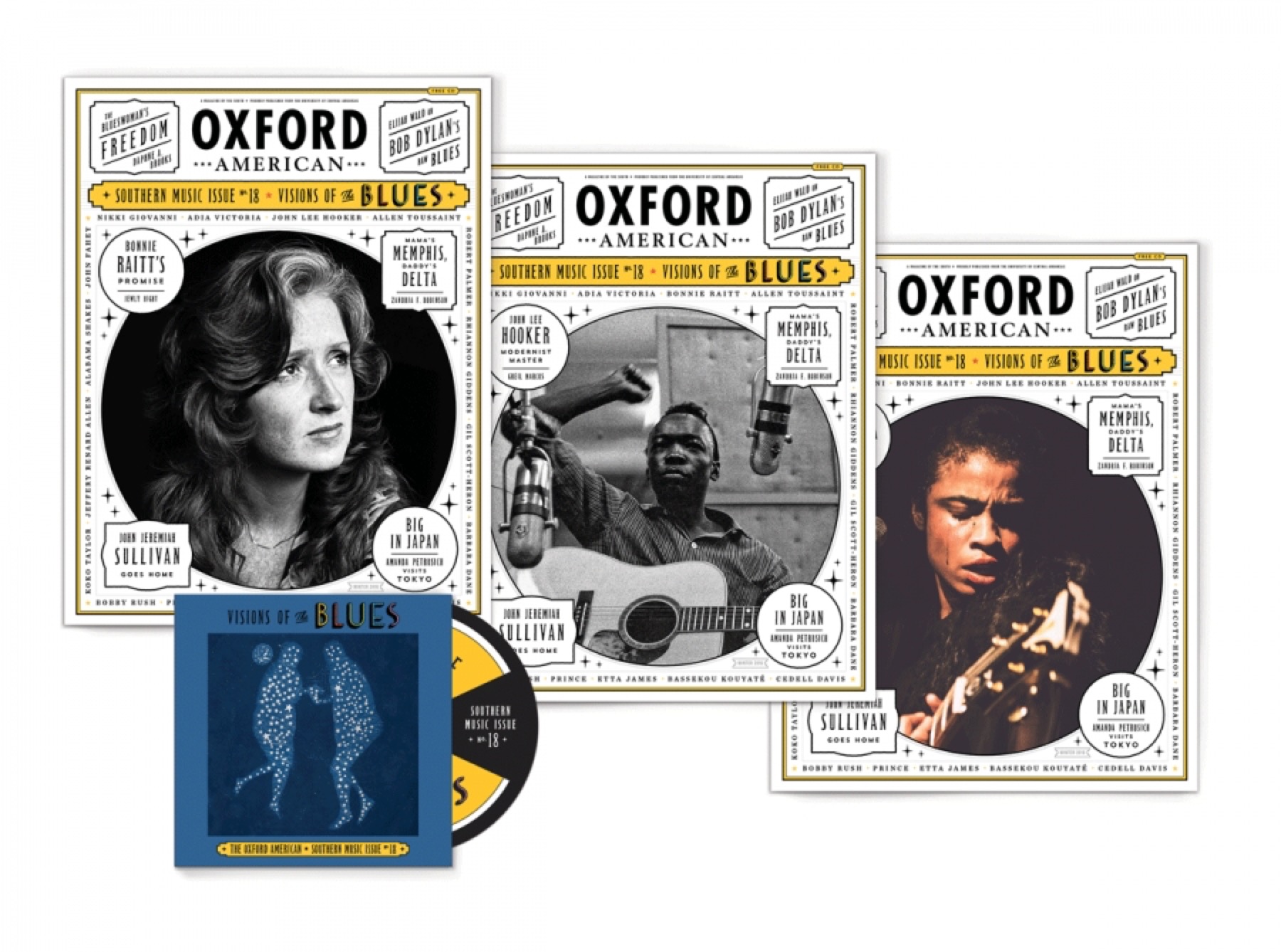
OUR 18TH MUSIC ISSUE & CD
By Oxford American
Introducing the Oxford American’s 18th Music Issue:
“Visions of the Blues”
Across the 160-page magazine and 23-song CD compilation, we’re celebrating one of the South’s greatest cultural exports: blues music. The issue comes in multiple covers, showcasing three generations of blues artists: John Lee Hooker, Bonnie Raitt, and Adia Victoria.
Order the issue here.
The CD features classic blues (Charley Patton, Allen Toussaint, Big Mama Thornton) alongside contemporary artists reinterpreting the genre (Alabama Shakes, Bassekou Kouyaté, Regina Carter), plus rare recordings (including a never-before-released vintage CeDell Davis track). The magazine contains new work by some of the best music writers of our time (Greil Marcus, Daphne A. Brooks, Elijah Wald, John Jeremiah Sullivan) and essays by first-time Oxford American contributors (Jeffery Renard Allen, Rashod Ollison, Sarah Bryan, Zandria F. Robinson), as well as stories from OA regulars (Amanda Petrusich, Jewly Hight, Cynthia Shearer, David Ramsey).
Next week, we’ll post the issue’s full table of contents and CD track list. Here are just a few highlights from the magazine:
“Few other musicians have the artistic and political audacity to invite listeners back in time—to the 1850s!—as a means of making sense of our current crises.”
Past Is Present
Gayle Wald on Rhiannon Giddens
“He’s had a hard life, but he kept on living. And kept on playing—often in obscurity, Davis has been playing hardcore, wacko, lowdown Delta blues for more than seventy years.”
Still Around Here
David Ramsey on CeDell Davis
“I couldn’t quite figure out why Japanese listeners had come to appreciate and savor the blues in the way that they seemed to—lavishly, devotedly. Blues is still an outlier genre in Japan, but it’s revered, topical, present.”
Sweet Bitter Blues
Amanda Petrusich in Tokyo
“He watches the song grow, full of wind and sky and dirt and water, coming and going, rising and falling—one heap of sound. He knows what inflections of the blues mean red house, blue rain, midnight lightning.”
Heads
Jeffery Renard Allen imagines Jimi Hendrix
“Some folk think the blues
Is a song or a way
Of singing
But the blues is
History”
The Blues
Nikki Giovanni
“What Johnson conjured for exactly three minutes and thirty seconds was an ethereal instrumental lament barely of this Earth. When the red light flashed three times to signal the approach of the dead wax—the end of the groove—someone tapped Blind Willie Johnson softly on the shoulder to conclude his playing.”
Unearthly Laments
Christopher C. King on Blind Willie Johnson’s “Dark Was the Night, Cold Was the Ground”
“The blues was born on a riverboat between Louisville and New Albany, along those docks, in the 1890s. I mean, the blues was born nowhere, of course. Or it was born many places. Polygenesis: that is the scholar Jeff Titon’s term, and the closest we can get to the truth. Multiple points of origin, coalescing and coinciding. And contradicting!”
Baby Boy Born Birthplace Blues
John Jeremiah Sullivan on his hometown’s history
“. . . we can’t really understand blues slide without imagining some kids on Oahu running steels over their guitars in the 1890s.”
That Winsome Moan
Ian S. Port on the Hawaiian origins of blues slide guitar
“I’ve discovered over the years that some of the smartest women I know are also into Bonnie Raitt.”
Mighty Tight Woman
Jewly Hight profiles Bonnie Raitt
“Think of these women, coming out of the South and up to Milwaukee, arriving finally in tiny, all-white Grafton by either streetcar or automobile and feeling their way in a studio for the first time. As they fought the forces of shell-shocked alienation, disorientation, and possibly stage fright, the musical conversations between these two gifted artists created other worlds for them to fleetingly inhabit.”
See My Face from the Other Side
Daphne A. Brooks on Geeshie Wiley and L. V. Thomas
“Daddy had a blues all his life that I couldn’t begin to know, though I had so desperately tried to understand it as his firstborn and accomplice.”


